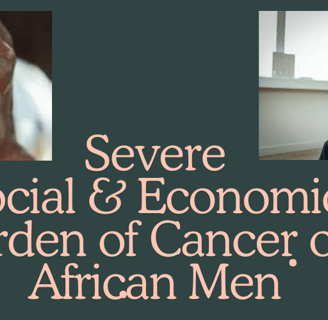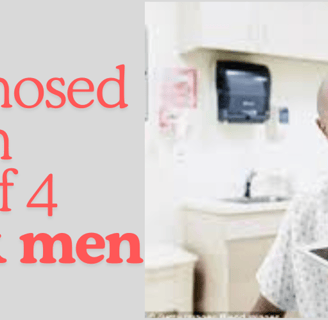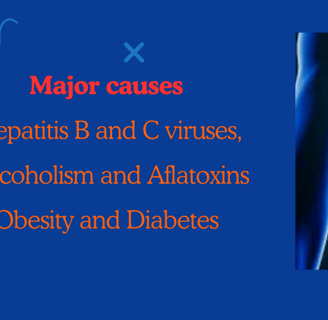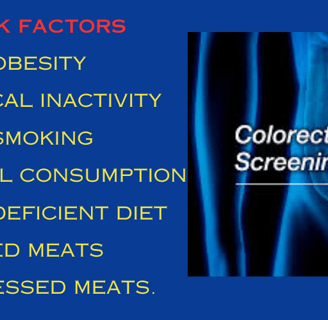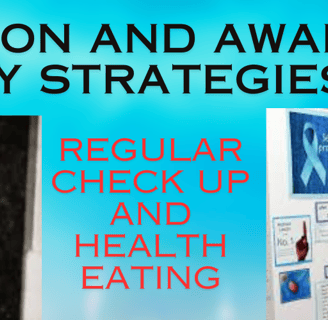Understanding the Three Major Cancers Affecting African Men
ChochoAfrica
1/3/202510 min read


Introduction to Cancer in African Men
Cancer is still a major health problem all over the world although it affects certain groups of people more often. Several cancers are on the rise among the African men and this has led to more cases of morbidity and mortality. This is important in order to manage the risks that are concerned and to enhance the results.
Among the cancers, prostate cancer, liver cancer, and colorectal cancer are the most common cancers that affect African men seriously. Although the awareness of these cancers is on the rise, most men are not aware of their predisposition and signs of these diseases. This low level of awareness means that many patients are presented at a late stage, thus reducing the possibilities of cure and management.
These cancers have implications that are not limited to the person’s health; it affects the family and the community as well as the economy. Men who are diagnosed with cancer at the advanced stages not only have to deal with the physical suffering but also the psychological and monetary burdens. Also, the high incidence can put a strain on the limited healthcare facilities that are already challenged in dealing with the rising incidence of cancer. Thus, it is crucial to promote measures that improve on early detection by encouraging people to undergo regular screenings and health check-ups.
In many African cultures, the conventional beliefs and perceptions concerning cancer hinders the patients from seeking the required medical care. This therefore creates a twofold problem: First, the absence of timely treatment and second, a psychological burden which sustains myths. The public still has a limited but important understanding of the issues concerning cancer including the symptoms of cancer, the factors that put them at risk and why early detection is important. Thus, it is crucial that the healthcare professionals, policy makers, and the community come together in order to raise awareness among African men about cancer.
Prostate Cancer: The Most Common Cancer Among African Men
Prostate cancer is the leading cancer that is being diagnosed in men in Sub-Saharan Africa and was estimated to be 23% of all cancer diagnoses in the region in 2018. This figure highlights the need for the early identification and management of cancer and the consequences of the increasing cancer burden in this population. Some of the risks increase the chances of prostate cancer in African men like age, family history, genetic factors, diet, and physical activity.
Prostate cancer is one of the most common cancers affecting men, especially as they grow older; the risk of getting prostate cancer is high especially in men who are over 50 years of age. Furthermore, men who have a family history of this disease are at higher risks therefore making family counseling important. There are also genetic mutations which have been discovered as possible risks therefore calling for specific screening measures. Other factors which may be associated include; diet, physical activity and other diseases; high intake of saturated fats and low intake of fruits and vegetables may increase the risk of this cancer as well as lack of exercise.
Some of the common symptoms of prostate cancer may appear in the advanced stages of the disease and can be in the form of urinary problems such as difficulty in urination, blood in the urine, sexual dysfunction including erectile dysfunction and pelvic pain. These symptoms are very painful and can really affect the quality of life of an individual and should be seen by a doctor as soon as possible. The current trends of prostate cancer incidence and mortality in African men present a major health issue whereby many of the cases are being detected at the advanced stages hence worsening the prognosis.
This is why early diagnosis by means of routine screening is important. Detection of prostate cancer has been made possible by techniques like PSA testing and digital rectal examinations especially before the disease reaches the advanced stages. Increasing the awareness of the campaigns and enhancing the availability of the screening facilities are some of the measures that can help in decreasing the incidence of prostate cancer in African men and thereby saving lives and improving the quality of life of those affected.
Liver Cancer: The Second Major Cancer Concern
Liver cancer is the second most common cancer in men in Sub-Saharan Africa, it affects about 8% of all cancer cases presented in the region in 2018. This is a startling figure which highlights the importance of increased awareness and early intervention in this condition. The main aetiologies of liver cancer include hepatitis B and C viruses, alcoholism, and aflatoxins which are naturally occurring toxins that are produced by fungi and affect crops. Other risks include; obesity, diabetes and other genetic conditions that affect the liver.
Liver cancer more often presents its common symptoms only when the disease has reached an advanced stage thus making it difficult to detect at the initial stage. Some of them are as follows: Weight loss with no known reason, abdominal pain, distention of the abdomen, loss of appetite and jaundice which is a condition that is characterized by the yellowing of the skin and the eyes. Such symptoms are rather vague, and this consequently results in late diagnosis of the disease, and this poor prognosis for those affected. It is therefore very important to know these symptoms and the need to be vigilant so as to identify the disease in its early stages.
The incidence of liver cancer also differs from one country to another within the region in accordance with the different levels of access to health care, the level of development, and the prevalence of risk factors. For example, countries with high prevalence of hepatitis B and C including Nigeria or Ghana have high rates of liver cancer. This public health problem cannot be solved only with individual efforts, but it also needs screening campaigns focused on people at a high risk. In addition, some behavioral measures like balanced diet, physical activity, and moderation in alcohol intake can help to prevent liver cancer. In the end, it is possible to state that enhancing people’s knowledge about liver cancer may also enhance the health status of the affected populations.
Colorectal Cancer: The Rising Threat
Colorectal cancer has emerged as the third most common cancers among African men . In the recent past, the diagnosis rates have been on the rise indicating the need to enhance people’s awareness and early intervention. There are numerous causes of this increasing trend which may include alterations in the dieting habits, reduced physical activity, hereditary tendencies that might be different with the different cultural groups.
Some of the known risk factors for Colorectal Cancer include; obesity, physical inactivity, smoking, and alcohol consumption. Other factors that have been found to increase the risk of this disease include; a diet that is deficient in fibers and rich in red meats and processed meats. This makes it important for African men especially those who have a family history of colorectal cancer to be aware of these risks. This is why it is important to know the symptoms of colorectal cancer as they may occur in the initial stages with subtle signs. Some of them are: Alteration in the bowel habits, rectal bleeding, weight loss with no clear explanation and abdominal pain.
To tackle the problem of colorectal cancer and decrease its occurrence, there must be strong screening and health promotion programs which include screening programs and awareness campaigns among the ages 45 and above. It is recommended that such programs should be in a position to encourage African men of high risk. Thus, supporting colorectal people cancer with proper health education, right the behavioral community changes, diet habits , understanding exercise, the importance of to taking care of their health thus reducing the impact of this disease to the African male.
The Social and Economic Impact of Cancer on African Men
Cancer is a major problem in Sub-Saharan Africa with even greater impact on men in the region through the social and economic burden it causes. Cancer not only affects the physical well-being of people, but also has adverse effects on families and societies. For most of the African men, this disease presents them with the harsh facts of weak health care systems, limited access to the needed therapies, and the enormous costs which can be ruinous.
It is a common occurrence that families are affected most by the economic impacts that are related to cancer. The expenses that are incurred in the diagnosis, treatment and the management of the disease can rapidly increase and create a lot of pressure on the finances. Most of the families have had to spend all their savings or even take loans to meet the costs of treatment. This financial burden creates stress that can lead to poverty and affected individuals as well as their dependents. Also, when the head of the family or the main income earner becomes sick, this may lead to loss of income and therefore affect the financial status of the family.
The community structure also suffers in the presence of increasing cancer rates among men as key population is depleted of its productive members (Contributors within the social and economic structure). The psychological damage is very severe and this has implications for family relationships, social relations and cohesiveness of the society. In cultures where the society is dominated by male figures such as the father, brother and son, the effect can be compounded when these individuals fall sick or die of cancer thus creating a gap within the family that performs certain roles.
In order to tackle such issues, it is crucial to understand that there are numerous barriers to health care access in majority of the African countries. This entails inequalities in the delivery of quality cancer treatment and this leads to increased cases of late diagnosis and poor treatment options. This therefore means that there is need to make changes in the health care systems in order to improve the treatment in Africa. Cancer treatment financing, early identification of the problems, and the need to promote the integrated community approach to cancer caring and for men.
Prevention and awareness are very important in the prevention of the three cancers that affect African men namely prostate, liver and colorectal cancer. This paper shows that the implementation of effective prevention measures goes a long way in preventing these conditions. In order at the individual level, a healthy lifestyle should be taken into practice. This means avoiding the intake of foods that are not healthy such as foods that are processed and contain high levels of fats and sugars and instead taking more of fruits, vegetables and whole grain products. Exercise is also as important as the other factors in that it assists in the control of weight and in the enhancement of the general health.
Furthermore, it is also essential to understand the significance of regular visits to the doctor and how timing of cancer detection matters. This is because cancer can be detected at its earliest stage through screening tests. There should be more encouragement on the need to undergo screening especially for prostate and colorectal cancers. Therefore, men who are 50 years and above or those with family history of such diseases should be encouraged to visit their doctors for screening.
Awareness campaigns are very effective in creating awareness of the cancer threats and measures that are recommended by the society. Such campaigns should aim at raising awareness of the signs and causes of the disease as well as the importance of prompt diagnosis. Community education programs can involve local champions to create awareness among men and ensure that discussions regarding cancer are not avoided. This will also involve encouraging the society to embrace the importance of healthy living and screening to change the perception of people towards managing their health.
It is also important to engage with the local healthcare providers in order to develop appropriate resources for teaching people about cancer and also for encouraging them to go for screening. Workshops, health fairs, and informational pamphlets in different languages will make sure that the important messages get to the different people. In this way, by paying attention to the above mentioned prevention measures, we can increase the community’s ability to combat these cancers which are common in African men.
Conclusion: The Way Forward
In conclusion, it is imperative to focus on the most common cancers that affect African men including prostate, liver and colorectal cancers. All these cancers are different in their manifestations and dangers and the presented data show that there is a high necessity to develop efficient prevention and treatment methods. It is important to know about these cancers because if detected at the early stage, the treatment is easier and more effective. Such community education programs and health initiatives can help in raising awareness of the symptoms and risk factors among the men and encourage them to consult a doctor at the earliest.
Furthermore, preventive measures like lifestyle changes, nutritional diet, and fitness regimes can also help in preventing the occurrence of these cancers. When people in communities embrace the culture of health, this means that men will be encouraged to take care of their bodies and also visit the doctor for checkups. It is also important for institutions to promote for the provision of proper health care facilities and the provision of the necessary facilities for the early detection and treatment of the disease. It is also important to consider the health care system as a whole which may require enhancement in order to provide proper cancer care.
It can, therefore, not be overstated that social support is very essential. The integration of family members and the formation of support groups help in the development of a stronger structure for people with cancer. These systems offer emotional and practical support which men need to deal with diagnosis and treatment. Thus, joining forces to raise awareness of prostate, liver, and colorectal cancers, we can contribute a lot to the struggle against these cancers.
In order to make a significant change, it is recommended that people should come forward and demand for more funding for cancer research and for better cancer treatment facilities. The health of those affected by it and their families is something that is greatly influenced by our efforts to increase awareness of the disease, the importance of prevention and the availability of adequate care. United, we can strive to envision a world where quality health care may help minimize the effects of such losing battles.

